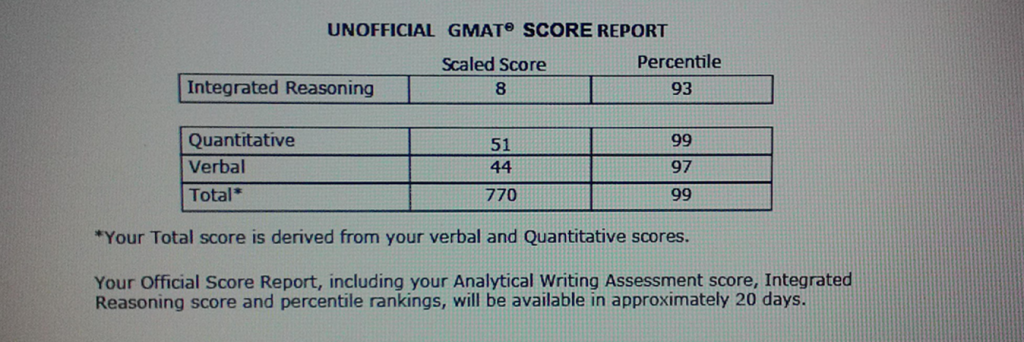Almost everyone at the start of one’s GMAT journey is faced with the dilemma, which GMAT resource or service provider to choose.
Normally this question of choice is not much of an issue in other industries. For example, in the travel industry, you can choose from a variety of travel providers (Expedia, TripAdvisor, Booking, Priceline, etc) and not be worried because if you have a bad experience, you can just move to another service provider the next time you travel.
Why? – That’s because you are sure you will be taking another trip one day.
But with the GMAT – it’s a ONCE in a lifetime experience (or may be twice or thrice for those who could not reach to their target score). You need to choose a resource that:
1) Gets you results / saves you time. Prepare hard and get your desired target GMAT score in one go. Your GMAT instructor should help you reach your target score without wasting too much time. For this, prefer to look out for someone who is well aware of GMAT nuances.
2) Is convenient / accessible – One should be able to reach out to one’s GMAT coach or GMAT instructor convenient and should feel welcome whenever one comes with doubts. A good GMAT coach should be a good motivator as well.
3) Trustworthy. Why? Because you only have 1 shot (may be 1 or 2 more, but that is after you fail at the first attempt, which means something went terribly wrong. In all likelihood you had a not so good or experienced GMAT instructor or coach)
If you get yourself into the real world of business, you’ll see what makes businesses work. Consumers love features — so in the GMAT world, the big organizations (as with any other industry) upsells you on a variety of features. More and more practice questions. More and more text explanations. More and more classes. More mobile apps with even more questions. And of course study guides.
Up to a certain point, more features don’t get you what you really want.
Why? Because the GMAT is not like regular consumer products. It’s a test (and that too adaptive) – and you are scored based on your reasoning skills. So even if you keep consuming hundreds and hundreds of questions or practice tests but your mental sharpness doesn’t go up, you’ll be stuck with a low GMAT score.
Again – the role of instructor comes in. You can get a good GMAT score if someone is monitoring your progress and will see to it that you are doing questions which help you develop your reasoning skills along with your logical ability.
Making the assumption that “(only) practice helps increase your GMAT score” is extremely dangerous and may prove lethal if you do not have time to re-take the GMAT. If you read online, you’ll see tons of stories of students studying like crazy but never seeing any improvement to their score.
Why? Because what matters more than features is your thinking process. What’s going on in your mind when you read a question? When you eliminate and pick the right answer? How fast are you doing this in a time-pressured environment?
Here you go Again – the role of your GMAT instructor comes into picture. You need someone as your GMAT coach or GMAT instructor that can help you get rid of all your doubts and explain in the easiest of ways to understand how you should tackle different types of problems. I know this is a time consuming but then again GMAT is a ONCE IN A LIFETIME experience and for sure, you don’t want to take chances in such situations.
Now coming on to actual resources that you can opt for, assessing which GMAT course is the best is fairly difficult to identify purely because of the number of parameters involved. There’s no silver bullet. Every option has its own strengths and weaknesses.
There are three types of GMAT resources/courses, in order of increasing cost and effectiveness:
Program/video, no live instructor such as Economist, Magoosh, GMATPill
Classroom, live/online instructor such as Manhattan or Veritas
Private Tutoring, live/online instructor
So, if you want to save on your GMAT prep, you may opt for Program/Video with no live instructor. There will be pre-recorded videos which you can watch and try to make the most from it. Obviuosly, since they offer minimum value, they are priced at the lower end.
If you can spend a little extra, you may join a live/online classroom such as the ones offered by Manhattan or Veritas. I hate to say this, but from all the feedback that I have, you should definitely avoid Princeton Review, primarily on the parameter of GMAT instructor quality.
The live or online classroom coaching gives a slightly better learning experience if the entire class is almost at the same level as you are, otherwise you will not get the worth of your money. If the class in general scores significantly higher than you, you will not be able to muster enough courage to ask below average doubts, and since your doubts will not be cleared you may not understand much past that point. And the same applies vice-a-versa as well. If the class in general scores significantly lower than you, you will end up discussing the below average level difficulty problems most of the time, which adds no value to you.
And if you can spend a decent amount and hire a good private GMAT tutor, in-person or online (as there are only a handful of really good private GMAT tutors worldwide, so it may be considerably difficult to find a good private GMAT tutor near your area) you will gain significant GMAT knowledge and stands the best possible chance to reach and even exceed your target GMAT score.
A top GMAT score not only helps you get noticed and thereby increasing the chances of gaining admission to top MBA programs but it also helps in getting significant scholarships as well from top B-schools. So even if you find it difficult to choose private GMAT tutoring (in-person or online) over live in-person or online classes, choosing private GMAT tutoring, can help you get that much extra and sometimes even more to get to a top B-school (doing a top MBA program of your choice) along with getting handsome scholarships as well, thereby proving the most cost-effective resource of all.
The best option depends on your budget and how much you need to improve your score, and how quickly you need to do so. If you have more time/smaller score gap to bridge/less money (several months, less than 60 points and sub 700 target) you could start with the prerecorded courses. If you have less time/larger score gap to bridge/more money (2 months or fewer, more than 60 points or 700+ target) you’ll want to opt for private tutoring.
Finally, to answer the question asked in the article heading – this is something that you should discover from referrals. The quality of your prep course is highly dependent on the teacher you get. An amazing teacher is an amazing teacher, regardless of company.
But then again, how many great teachers get 750+ on the GMAT and want to work at these dead-end monotonous organizations for peanuts?
My point of view – GMAT (is one of the most beautiful standardized tests ever designed) can be aced, but that surely requires guidance of top GMAT instructors who have aced the GMAT themselves and can really make a difference in your GMAT prep.
Stay tuned for more GMAT fun!



